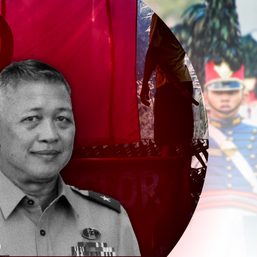SUMMARY
This is AI generated summarization, which may have errors. For context, always refer to the full article.
![[Bodymind] Forgiveness, Enrile, and Bongbong Marcos Jr.](https://www.rappler.com/tachyon/2024/03/forgiveness-enrile-bongbong-march-6-2024.jpg)
The ability to forgive is a wondrous, yet puzzling, gift. Some people even say it helps the forgiver, the one wrongly done by, more than it does the forgiven, the one who did wrong.
To understand forgiveness, perhaps it is best to start with what it is not. Nobody does that better than Doctors Enright and Coyle, who write: “Forgiveness is different from pardoning (which is, strictly speaking, a legal concept), condoning (which involves justifying the offense); excusing (which implies that a transgression was committed because of extenuating circumstances); forgetting (which implies that the memory of a transgression has decayed or slipped out of conscious awareness); and denial (which implies an unwillingness or inability to perceive the harmful injuries that one has incurred).”
The 2000 book Forgiveness: Theory, Research, and Practice (editors Drs McCullough, Pargament, and Thoresen) emphasizes that “(despite all the different definitions of forgiveness) it is built on one core feature: when people forgive, their responses (i.e., what they feel and think about, want to do to, or how they actually behave) toward people who have offended or injured them become less negative and more positive – or prosocial – over time.”
While forgiveness is a core belief of most religions, it has only been studied by social scientists in the last two decades. Still, their research has come up with some interesting findings.
For example, an article by Reiss and Havercamp (1998) called, “Toward a comprehensive assessment of fundamental motivation,” states that seeking revenge is so primal that it is considered to be one of 15 fundamental human motivations. This was confirmed by a later (2000) journal article, “The Neuropsychological correlates of forgiveness,” by Newberg, d’ Aquili, Newberg, & de Marici, which added that the tendency to retaliate or seek retribution after being betrayed is deeply ingrained in the biological, psychological, and cultural levels of human nature.
In other words, Mr. President, no one can blame you for harboring ill feelings towards JPE. Everyone would, in fact, understand totally. Research confirms a desire for revenge is so basic it is part of who we are as human beings. I guess this is why Alexander Pope’s reminder that “to err is human, to forgive divine” strikes so many of us in its patok na patok”-ness. It is so true: Mahirap talaga magpatawad – lalo na kung parang napahiya ka sa buong mundo (It’s really difficult to forgive, especially if the betrayal was played out in the eyes of the world). The fact that you can forgive despite all this, is quite admirable.
To show how natural non-forgiving is, primatologists have documented that certain species of old world primates (including chimpanzees and macaques) coordinate retaliatory responses after being victimized by another animal, sometimes even after considerable time has passed.
I am in no way suggesting that you are a chimpanzee or macaque, Mr. President, but if even these primates can hold grudges for a long time, how much more a human being who saw his father driven out from his homeland to live out his last years in a country not his own?
Let us now go to the lunch you hosted to celebrate the 100th birthday of the man you appointed chief presidential legal counsel of the Philippines.
What really blew my mind was when you said of JPE: “I must admit, to have him in my corner allows me to sleep better at night.”
Really, Mr. President? When you are at your most vulnerable, you sleep better at night because of JPE?
I’m pretty sure that in the first 19 months of your presidency, you have not bestowed as much largesse as your father did during his 21 years of ruling the land. I’m also sure you still remember what happened that fateful February 22, 1986, when Enrile and Ramos betrayed your father by announcing that they had resigned from their positions in his Cabinet and were withdrawing support from his government.
In general, people have more difficulty forgiving offenses that seem more intentional, severe, and have more negative consequences. While many Filipinos would disagree that Cory’s becoming president was negative, I have no doubt you believe otherwise. Many (myself included) believe that People Power would have catapulted Cory Aquino to her presidency even without JPE and Ramos announcing the withdrawal of their support from your father’s government.
However, among the many events that might have hastened it was JPE’s bleating to Cardinal Sin that “I don’t want to die…If it is possible, do something. I’d still like to live,” which helped Cardinal Sin’s decision to appeal to Filipinos to go to the vicinity of the national military headquarters along EDSA.
WOW. Again, talk about forgiveness.
Of course, research shows that people tend to be more forgiving as they age.
You were only 29 when you left the Philippines for Hawaii, and are now 66 years old. A lot can happen in that time to have made you a kinder, gentler, person, but for someone like you, who cares about your family and your family’s reputation as much as you are purported to? Wow and double wow.
That is why I cannot help feeling you are an astounding fellow, unless of course, you believe in the old adage, “Keep your friends close, and your enemies closer” – especially wily politicos who have managed to thrive no matter who is in power. – Rappler.com
Add a comment
How does this make you feel?
![[Newspoint] A Freedom Week joke](https://www.rappler.com/tachyon/2024/06/20240614-Filipino-Week-joke-1.jpg?resize=257%2C257&crop_strategy=attention)



![[In This Economy] Marcos’ POGO ban is popular, but will it work?](https://www.rappler.com/tachyon/2024/07/thought-leaders-marcos-pogo-ban.jpg?resize=257%2C257&crop=255px%2C0px%2C720px%2C720px)
![[Rappler Investigates] POGOs no-go as Typhoon Carina exits](https://www.rappler.com/tachyon/2024/07/newsletter-graphics-carina-pogo.jpg?resize=257%2C257&crop=424px%2C0px%2C1080px%2C1080px)



There are no comments yet. Add your comment to start the conversation.